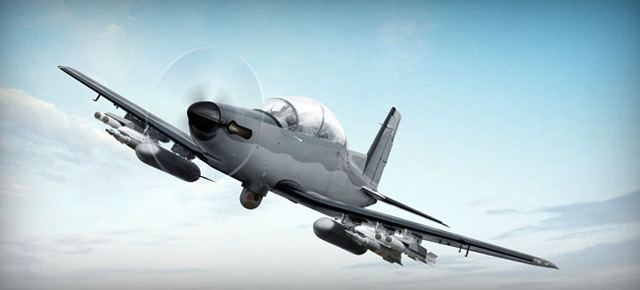
Hawker Beechcraft has opted to put the AT-6 in production, hoping to help its case for landing a lucrative contract to equip the Afghan air force. Photo courtesy Hawker Beechcraft.
When Hawker Beechcraft’s AT-6 and Embraer’s Super Tucano were duking it out over an Air Force contract that was awarded to Embraer, then revoked and opened again for bidding, critics (most of them in Brazil) noted the AT-6 wasn’t in production. That’s about to change.
Limited production has begun based on “…significant indications of interest around the world,” and could help the company recoup investment costs if sales develop. Still, Embraer can continue to point out that the Tucano is not only in production, it is tested in combat. Hawker Beechcraft officials point out they are using battle-tested weapons systems and sensors from the A-10C Warthog aircraft that have been installed in the equipment bay of the AT-6. The weapons have been tested in military exercises. The sensor is from a Super King Air 350 called the MC-12W by the military and used for intelligence, surveillance and reconnaissance. The Air Force operates 42 of them, according to an Air Force fact sheet written in May 2012.
The A29 Super Tucano is offered in the United States by Sierra Nevada Corporation of Sparks, Nev. In making the original decision now withdrawn, the Air Force cited “deficiencies” that threatened the mission of the AT-6. It later said that a challenge by Hawker Beechcraft to the $355 million award uncovered incorrectly done paperwork, forcing the contract process to begin anew.
Boeing and Embraer extended an agreement July 10 to collaborate on the Tucano, saying it will increase the aircraft’s capabilities for exactly the roles the Air Force has specified.
A detailed response to the renewed competition was delivered by Hawker Beechcraft and Sierra Nevada in June to Wright-Patterson Air Force Base near Dayton, Ohio. The attack aircraft competition is aimed at providing light air support in Afghanistan. For Hawker Beechcraft, it means 500 engineering jobs and 300 skilled labor jobs that would remain in Wichita. Sierra Nevada has 2,100 workers on current projects. A decision is expected in the second quarter of 2013.
Embraer also has ties to the United States labor force. The defense systems on the Tucano are made by Israel-based Elbit systems which has sites in several locations in the United States. In addition, the aircraft are to be assembled in a hangar at Jacksonville, Florida, that was originally designed for maintenance.



